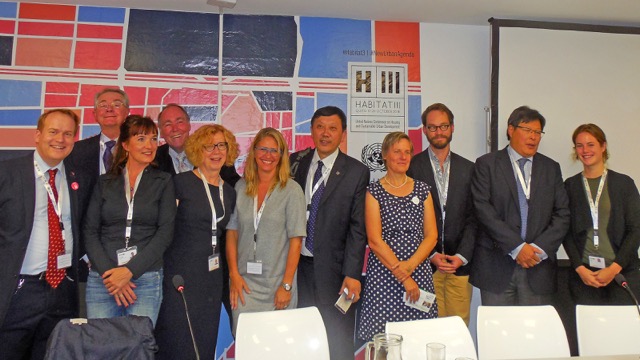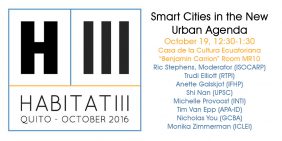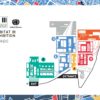Smart Cities in the New Urban Agenda
October 19, 12:30-13:30, Casa del la Cultura Ecuatoriana, Room 10
ISOCARP Side Event workshop at Habitat 3 in Quito with the participation of leading global non-profit organisations.
- six minutes (6′) presentations on each organisation’s perspective on ‘smart cities’ in relation to the New Urban Agenda
- the order of presentations:
- Trudi Elliott, Royal Town Planning Institute
- Anette Galskjot, International Federation for Housing and Planning
- Shi Nan, Urban Planning Society of China
- Michelle Provoost, International New Town Institute
- Tim Van Epp, American Planning Association, International Division
- Monika Zimmermann, ICLEI Local Governments for Sustainability
- Nicholas You, Global Cities Business Alliance
- brief audience discussion after the panel presentations
- following this event, a compilation of short papers on this topic open to all organisations within the Global Planners Network and Habitat Professionals Forum

Nicolas Buchoud, Grand Paris Alliance; Tim Van Epp, APA; Michelle Provoost, INTI; Trudi Elliott, RTPI; Anette Galskjot,IFHP; Shi Nan, Urban Planning Society of China; Monika Zimmerman, ICLEI; Greg Mews, Urban Synergies Group; Nicholas You, Global Cities Business Alliance; Lena Niel, Deltares
The event showcased a wide range of information and communications technology (ICT) projects relevant to city planning and management in both developed and developing countries. This event also provided networking for cities to share urban planning strategies connected with ICT to become more sustainable, resilient and regenerative. The main theme was the relationship between ‘Smart Cities’ and the New Urban Agenda with particular emphasis on the “Urban and Spatial Planning and Design” Issue Paper.
The goal of building a smart city is to improve quality of life through sustainable, (e.g. energy, water, waste, transportation, emissions) or social (e.g. social and economic inclusion, governance, citizen participation), through transparent and inclusive information feedback mechanisms. It commits to continuous learning and adaptation and, through the application of systems thinking, aspires to improve its inclusivity, cohesion, responsiveness, governance and the performance of its social, economic and physical systems. [ICLEI] A ‘smart city’ approach will be instrumental, if not invaluable, in achieving the New
Urban Agenda goals.
Implementation of the New Urban Agenda will be strengthened, and- in some instances – dependent on ICT that is integrated with urban equity and poverty eradication; sustainable and inclusive urban prosperity and opportunities for all; and ecological and resilient cities. Planning and managing urban spatial development will require innovative ICT approaches and tools.

